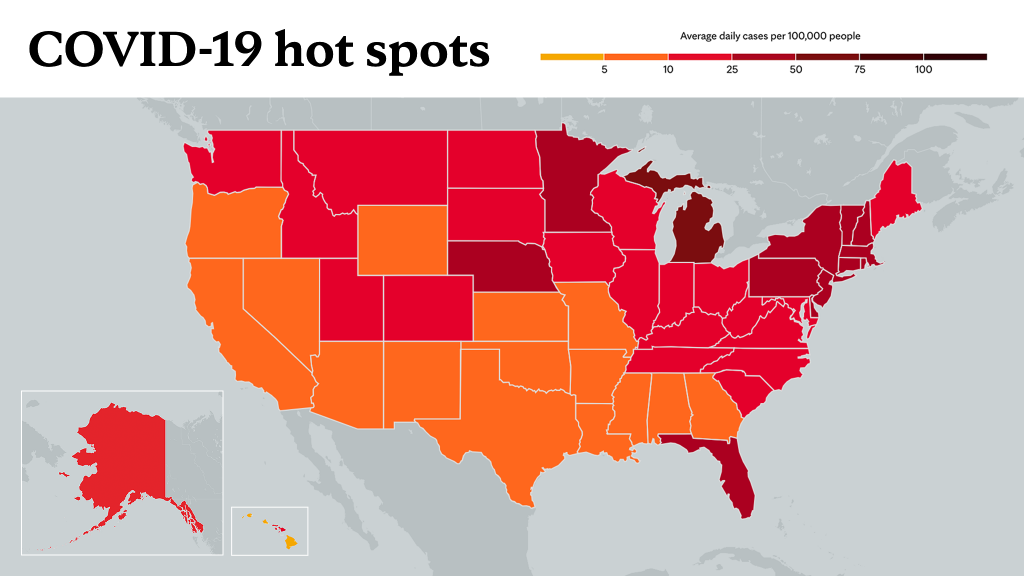More than 74 million Americans have thus far been fully vaccinated against COVID-19 - that's a fraction of the U.S. population. Vaccines are perhaps the best hope, along with following safety protocols, for ending the pandemic. If you haven't yet been vaccinated, it's normal to have questions.
In this Q&A, Dr. Abinash Virk, an infectious diseases expert and co-chair of the Mayo Clinic COVID-19 Vaccine Allocation and Distribution workgroup, answers questions about vaccine efficacy and safety, and why you should get vaccinated even if you've recovered from COVID-19 infection.
Watch: Dr. Abinash Virk answers questions about COVID-19.
Journalists: Broadcast-quality sound bites with Dr. Virk are available in the downloads at the end of the post. Please courtesy: "Abinash Virk, M.D./COVID-19 Vaccine Allocation and Distribution/Mayo Clinic."
Should people who have recovered from COVID-19 get vaccinated?
People who've had COVID-19 infection should still get vaccinated because the vaccine might provide them a longer duration of protection than COVID-19 itself would. This is something that we're still learning and, hopefully, we'll know more about over the next few months.
In general, we recommend that people should wait for about 90 days from infection before they get vaccinated. There is no harm if they get vaccinated beforehand. We know that they're fully protected from their own infection for the first three months, so they can wait for a few months before they get the vaccine and let the others get vaccinated.
The vaccines are found to be effective — but for how long?
We now have new information that tells us that Pfizer vaccine has protection up to six months based on data from the participants of the Pfizer clinical trial who have completed six months from full vaccination. And they have just recently shown that it is effective, up to six months. We have no doubt that Moderna, which is a very similar vaccine, will have a similar duration of protection," says Dr. Virk.
Will people need booster vaccines after being fully vaccinated against COVID-19?
The likelihood that we're going to need boosters is high. This is based on the fact that, No. 1, we don't know how long the duration is going to be good for with these vaccines. And, No. 2, we know that COVID-19 variants are rapidly emerging and spreading. The boosters will probably take into account these new variants and have a slight change in the vaccine as we go forward.
Is it safe to travel if you've received the vaccine?
The good news is that CDC has allowed travel after vaccination for people who have been fully vaccinated. That means two doses and two weeks after the second dose that people can travel because the vaccinations do prevent people from getting infected. There is protection, but we still recommend people wear their masks, even if you're traveling. We have to remember that protection may not be full especially for immunocompromised patients or those who are partially vaccinated, and at the same time, there are still many unvaccinated people who can be the carriers of the virus from one place to the other. And we have to continue to use a mask and social distance.
What to know if someone is hesitant about getting the COVID-19 vaccine
For the people who think that they've had COVID-19 and they don't need the vaccine, you still want to get the vaccine because it's going to give you long-term protection. For the people who are young and healthy who think that they are not going to get severe COVID, I want it for them. They should get the vaccine to protect themselves — because even young people can get severely ill. But more so, you should get vaccinated for your community, for your friends, for your family, and for your country. I would encourage every person to go out and seek your COVID-19 vaccine so that we can all go get back to our lives again.
______________________________________
Information in this post was accurate at the time of its posting. Due to the fluid nature of the COVID-19 pandemic, scientific understanding, along with guidelines and recommendations, may have changed since the original publication date.
For more information and all your COVID-19 coverage, go to the Mayo Clinic News Network and mayoclinic.org.
Learn more about: Tracking COVID-19 and COVID-19 trends.

Related Articles







